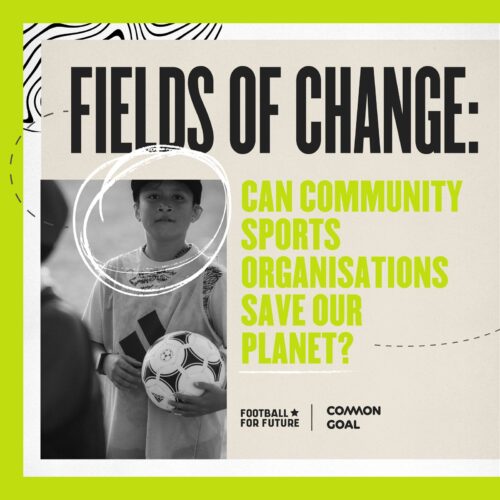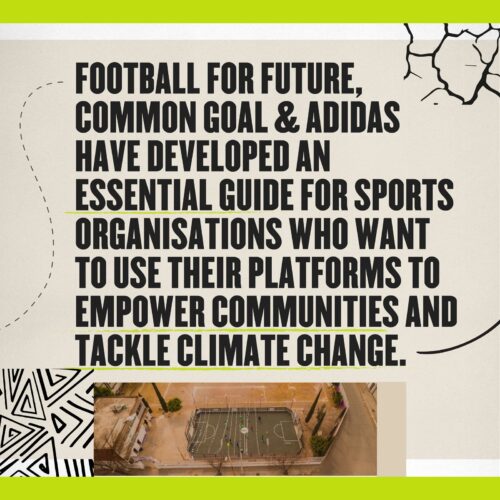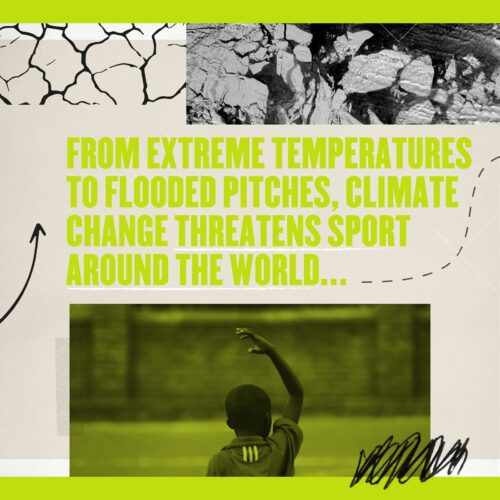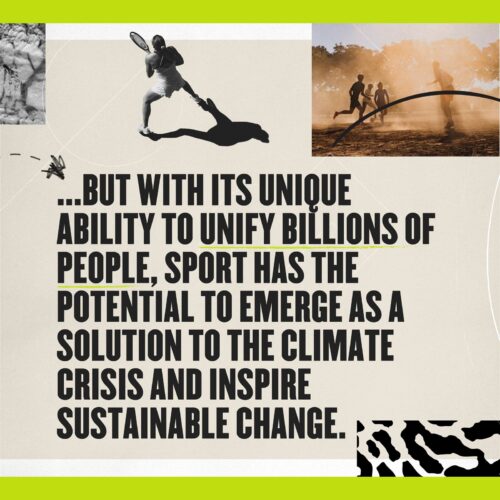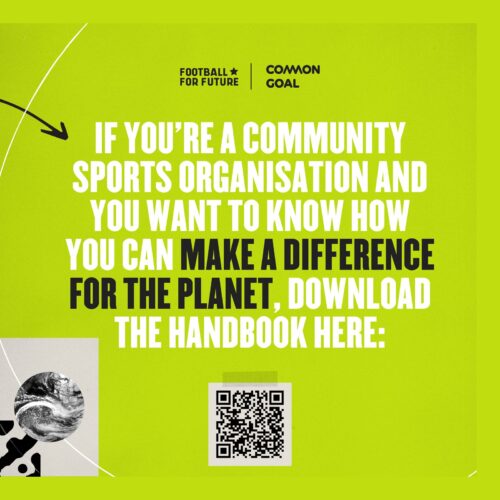AT RISK COMMUNITY SPORT ORGANISATIONS AROUND THE
WORLD THREATENED BY CLIMATE CHANGE TAKE FIRST-OF-ITS-KIND ACTION
Diverse sport-based community organisations, many based in the most vulnerable areas on Earth due to the effects of climate change, have celebrated the arrival of Fields of Change, the first ever sustainability resource for grassroots organisations. This unique training resource is designed to inspire sport for good organisations worldwide to integrate environmental sustainability into their projects and communities.
Fields of Change was created by environmental non-profit Football For Future and Common Goal, the social and environmental impact collective in global football, and has been supported by adidas under the company’s Move for the Planet platform. Sport is increasingly impacted by climate change – freezing and flooding pitches, extreme heat affecting athlete health, and limited access to sport for vulnerable communities are just a few of the challenges facing the sector. With sport playing a crucial role in communities worldwide, the arrival of the Fields of Change handbook provides organisations for the first time with the tools to adapt to these challenges while driving meaningful environmental action. The innovation has been celebrated by community leaders and elite athletes alike.
Alexei Rojas, the Colombia international and Arsenal Goalkeeper, said: “Sport is such a vital part of South America’s cultural identity that we should take a leadership position in advancing the conversation around climate action to take solid steps collectively every single day, no matter how modest. The Fields of Change handbook is such an inspiring step forward as it can be embraced by all sport-based organisations at the heart of our communities throughout the continent, while also being part of a wider international collective of change makers in sport.”
Emilio Martinez, regional project manager for love.fútbol in Mexico City said: “With higher rates of drought, coupled with a changing rainy season pattern, we are already seeing the effects of climate change on the communities we work in, and we want to be amongst the first groups taking meaningful action from the grassroots upwards when it comes to how community sports space creation can be a part of the solution. The Fields of Change handbook serves as a guide for us to take action, both here locally, and also collectively with other community organisations around the world. Operating in regions that are amongst the highest areas of risk of negative climate impact, we see an important opportunity for love.fútbol to take a leadership role in showing the rest of the sports industry what can be achieved if we all work together.”
Sofie Junge Pedersen, the Denmark international and Inter Milan midfielder said: “This is an important step in empowering grassroots sport organisations worldwide to take tangible action against climate change, with many of them facing the very real and urgent risk of its harshest impacts. The Fields of Change handbook is a game-changer, enabling grassroots sport to unite and work collaboratively in taking climate action. Climate change is a challenge for all of humanity, and we can only make meaningful progress if we move forward together, one step at a time.”
Greg Preston, Head of Football for Indochina Starfish Foundation in Cambodia said: “Fields of Change is a positive and groundbreaking initiative that allows us to embed sustainability into the heart of our community. It gives us all a pathway to educate and take action and allows us to be an active part of the growing community in international sport committed to driving climate action in and through sport.”
The Fields Of Change handbook compiles groundbreaking insights from learning sessions delivered to Move for the Planet grantees, specifically a collaboration of nine global sport for good organisations across eight countries and four continents. This handbook serves as an essential guide for sports organisations on their journey toward sustainability, offering practical tools and strategies for implementing environmental best practices. The handbook covers key sustainability topics, including:
● Understanding Sustainability and Climate Change: Explaining the unprecedented rate of environmental change, and how sport can respond to climate challenges on human timescales.● Sustainability in Sport: Highlighting how sport can lead both operationally and socially toward a sustainable future.
● Sustainable Infrastructure: Guiding organisations on how to measure, mitigate, and adapt their infrastructure to reduce environmental impacts.
● Waste Management: Offering effective systems for waste reduction, recycling, and responsible disposal.
● Climate Communication: Utilising sport’s global influence to communicate environmental messages and inspire positive behaviour changes.
● Sport and Sustainability Leadership: Encouraging athletes, clubs, and governing bodies to take a leadership role in climate action.
The Fields of Change handbook has already seen positive impacts, with organisations like Organization Earth in Greece tackling plastic pollution and recycling in refugee camps, and Fútbol con Corazón in Colombia, which is launching a recycling business to repurpose plastic waste.
Adidas has contributed through its Move for the Planet initiative, funding global projects that educate and engage communities on sustainability and enhance sports facilities to withstand extreme weather conditions. This initiative showcases the collective power of the sporting community to drive change, with sport for good organisations uniquely positioned to influence local communities and build a more sustainable future.
Elliot Arthur-Worsop, Football For Future Founder said: “Fields of Change is a significant milestone in the journey toward sustainable sport. For the first time, community sports organisations have a resource that empowers them to protect their communities, support their environment, and lead the way in climate action. Through this handbook, we’re seeing the immense potential of sport to not only inspire but also actively drive change at the very heart of our communities. With support from adidas and in partnership with Common Goal, we’ve created something that goes beyond the pitch – it’s about building a legacy of resilience and sustainability for future generations”.
Jérémy Houssin, Common Goal Sustainability and Environmental Lead said: “Sport is a powerful unifier, and through Fields of Change, we’re mobilising that power to respond to one of humanity’s biggest challenges: climate change. This handbook equips community organisations with the knowledge and practical tools to tackle environmental issues, helping them become local leaders in climate action. We are thrilled to have collaborated with Football For Future and adidas on this project, showing that even small steps, taken together, can spark global momentum. This resource is a testament to what’s possible when we prioritise our planet’s future and work together across all levels of sport”.
The State of Play: Sport and Climate Change
● Global Wildlife Decline: Since Pelé lifted the 1970 FIFA World Cup, there has been on average almost a 70% decline in the populations of mammals, birds, fish, reptiles and amphibians, with human activities as the leading cause.
● Oceans in Crisis: By the time Coco Gauff is 50 years old in 2054, plastic in the oceans will outweigh fish.
● Sport’s Carbon Footprint: The global annual CO2 equivalent emissions from sport is estimated to be as much as 300 million tonnes – equivalent to the annual emissions of France.
● Olympic Concerns: Without rapid CO2 emission reductions, by the time of the 2032 Olympics in Brisbane, the world will have likely exceeded the 1.5°C global average temperature rise target of the Paris Agreement, with potentially irreversible climatic consequences.
Despite these challenges, sport holds immense power to drive positive change. The Fields Of Change handbook – the first resource of its kind – offers sport for good organisations the tools and guidance to lead sustainability efforts and create a lasting impact.
visit Football for Future here to learn more and download the guide
